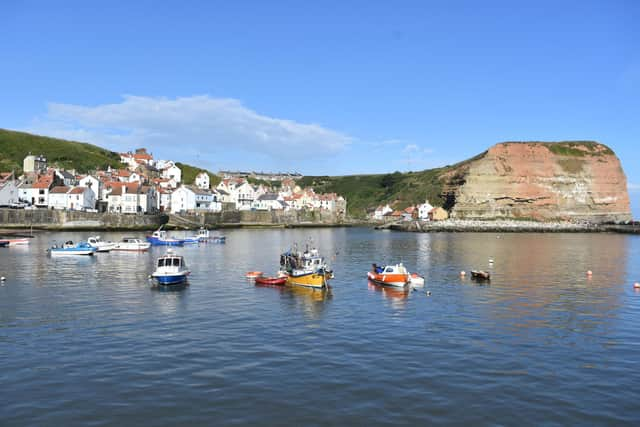Villages by the Sea: Archaeologists discover lost tunnel during BBC filming in fishing port of Staithes
Presenter and archaeologist Ben Robinson delves into the village's alum mining past, when it was at the forefront of chemical production to support the textile industry.
Villagers even collected their own urine to be used in the processes.
Advertisement
Hide AdAdvertisement
Hide AdAlum shale was extracted from vast quarries before being burnt in huge heaps along the cliff tops.


At the peak of alum production the industry required 200 tonnes of urine every year, equivalent to the produce of 1,000 people. The demand was such that it was imported from London and Newcastle, buckets were left on street corners for collection and reportedly public toilets were built in Hull in order to supply the alum works.
In the early nineteenth century Staithes was one of the largest East Coast fishing ports. Local fisherman John Cole, whose family has been in Staithes since the sixteenth century, shares stories of survival through hard times and explains why there are so many chapels in the village.
Ben also visits Diana Sharples, whose home, Top Cottage on the seafront, survived a battering from one of the worst winter storms.
Advertisement
Hide AdAdvertisement
Hide AdWith the help of fellow archaeologist Caroline Barrie-Smith and Dr Chris Gaffney's hi-tech surveying technology, Ben finds tunnels which were once part of an operation vital to the clothing industry and production of alum.
Ben said: "Who would have thought that wee would play such a vital part in the story of this coast? But without it, there would have been no alum, and without alum Britain's world-beating cloth trade could not have thrived.
"The scale of the alum industry here is astounding, and involved a long labourious, precarious process and staggering feats of engineering. The discovery of the top of a tunnel that led from the alum works all the way to the base of the cliffs, hundreds of feet below, was another highlight for me.
"The clever use of several types of 'geophys' survey side by side is what makes for excellent results.
Advertisement
Hide AdAdvertisement
Hide Ad"This early chemical industry here, and the iron industry too, led to the modern chemical and steel industries that have played such a massive role in shaping in this region.”
The new series also sees Ben travel to Thorpeness in Suffolk, Charlestown in Cornwall, Arnside in Cumbria, and finally Alnmouth in Northumberland.
Accompanied by local experts, Ben uses clues from buildings, street patterns, artefacts and the landscape to unravel why the village is there, and how its fortunes changed.
Villages by the Sea starts on Monday November 15 at 7pm on BBC Two.
